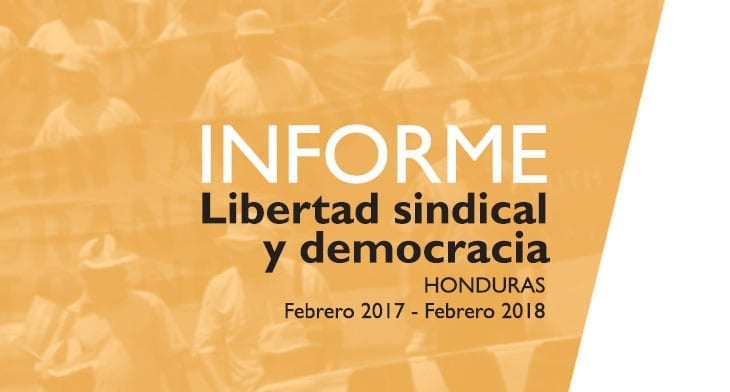
Mar 23, 2018
Two union activists were murdered in Guatemala and one in Honduras, while dozens of others were targets of violence—including threats of murder, kidnapping and stalking—over the past year, according to two reports released this week.
In Guatemala, “where the unionization rate is less than 1 percent, intolerance and violence against workers highlights, precisely, the mechanisms of terror to limit and, in many cases, to ignore those rights on the part of employers,” according to the Annual Report on Anti-Union Violence. The report, by the Network of Labor Rights Defenders of Guatemala (REDLG), found two more instances of violence in this reporting year (February 2017–February 2018) than in the previous period.
Since 2004, 87 union leaders and activists have been killed in Guatemala, one of the most dangerous nations in the world for union rights activists.
In Honduras, many of those targeted in the 39 documented instances of violence were organizing unions or seeking collective bargaining agreements in the agro-industrial palm oil sector in Colón, according to the report, “Freedom of Association and Democracy” by the Anti-Union Violence Network. Both networks are Solidarity Center partners. (The report is available in English, including an Executive Summary, and Spanish.)
Honduran Union Activist Targeted after Report Released
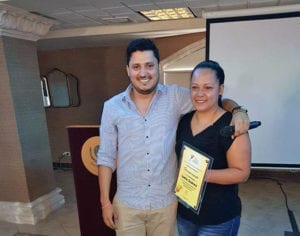
Isela Juárez is among Honduran union activists targeted with death threats. Credit: Anti-Union Violence Network of Honduras
Two days after the report on Honduras was released this week, union leader Isela Juárez, who has received death threats for her worker rights activism, was followed in a high-speed chase by two men on motorcycles before she took refuge inside the San Pedro Sula City Hall. Juárez, president of the Union of Workers of Municipal, Common and Related Services, (SITRASEMCA), also had been honored for her defense of human rights over the weekend.
The report on Honduras finds that 51 percent of the alleged perpetrators are public officials, including the military police, along with municipal authorities who harassed, coerced and fired nine workers to prevent them from forming unions.
Some 100 unionists and other members of civil society took part in the report’s launch, and several people violently targeted for their activism described their experiences. Since the network in Honduras began documenting cases of anti-union violence in 2015, 69 union activists have been targeted with violence, including seven who were murdered.
The report on Honduras also highlights a correlation between increased violence and the growing role of women in union leadership, and documents cases of unionists attacked during the post-election violence as they sought democracy.
In both countries, poverty and extreme poverty is high, with the World Bank estimating that in 2016, 65 of every 100 Hondurans lived in poverty, and 43 of every 100 in extreme poverty. In Guatemala, despite a growing economy, poverty rose to 59.3 percent in 2014.
The U.S. government has declined to consider anti-union violence in Central American Free Trade Agreement (CAFTA) complaints filed by the AFL-CIO and Guatemala and Honduran trade unions.
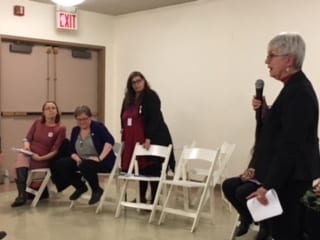
Mar 15, 2018
Nearly one in two women journalists have experienced sexual harassment, psychological abuse, online trolling and other forms of gender-based violence (GBV) while working—yet “up to three-quarters of media workplaces have no reporting or support mechanism,” says broadcast journalist Mindy Ran, citing results of a survey survey released this month by the International Federation of Journalists (IFJ).
Ran, IFJ Gender Council co-chair, overviewed the survey findings yesterday at the panel, “Challenging Impunity and GBV against Women Journalists and Media Workers,” one of dozens of parallel events taking place this week in conjunction with the 62nd session of the United Nations Commission on the Status of Women (CSW) in New York City.
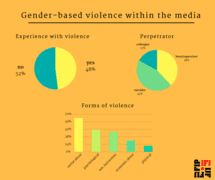
Credit: IFJ
Without safe and structured systems for reporting gender-based violence at work, employees are less likely to seek assistance—and, as the survey found, 66 percent of journalists who had experienced some form of gender-based violence said they had made no formal complaint.
“It is clear that the current approaches have had limited impact. We’re here to get practical,” says Ran, who opened the panel which included six experts in media and gender-based violence from around the world.
Journalists, like other workers, also experience gender-based violence outside their workplace while doing their jobs. The IFJ survey of 400 women in 50 countries found that 38 percent of perpetrators were a boss or supervisor and 45 percent were people outside of the workplace (sources, politicians, readers or listeners). Thirty-nine percent were anonymous assailants, such as through cyber bullying.
Gender-based Violence at Work: Global Issue Needs Global Solution
Mexico, one of the most dangerous countries in the world for journalists, has seen a “severe increase in violence against women journalists both online and offline,” says Aimée Vega Montiel, a research specialist in feminist communications at the Universidad Nacional Autónoma de México and vice-president of the International Association for Media and Communication Research (IAMCR). Yet there is a “cycle of impunity” and “media companies are not ensuring safety for women journalists,” she says.
Zuliana Lainez Otero, president of the Latin American Federation of Journalists and IFJ executive council member, agrees. “Media owners, at least in Latin America, don’t offer protection,” says.
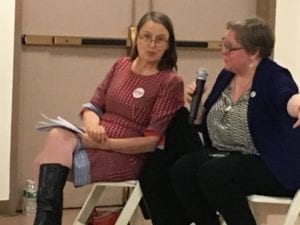
Marieke Koning from the ITUC and the CLC’s Vicky Smallman joined the IFJ discussion on gender-based violence at work. Credit: Solidarity Center/Tula Connell
Gender-based violence occurs around the world, and is one of the most prevalent human rights violations. Yet few laws address even some forms of gender-based violence at the workplace, and those are not enough or not enforced, further enabling employers to ignore the issue. Marieke Koning, International Trade Union Confederation (ITUC) policy advisor for gender equality, discussed how union activists, women’s rights champions and their allies can take action by joining the ITUC campaign for passage of an International Labor Organization (ILO) convention (standard) covering gender-based violence. Workers around the world could have access to a binding international standard covering gender-based violence at work after it is finalized.
The Solidarity Center has joined the campaign, which Koning says can give momentum to gender equality activists around the world, as did the years’ long effort leading to passage of the 2011 ILO Convention on domestic workers’ rights. Like the domestic workers’ campaign, which built powerful support networks around the world, Koning says, “we want to build alliances to pass the gender-based violence convention.”
Male Media Control ‘Should Be Next on Feminist Agenda’
Domestic violence also impacts those at the workplace, and Vicky Smallman, director of Women’s and Human Rights, Canadian Labor Congress (CLC), shared details of a CLC survey of more than 8,000 union members that found 67 percent had experienced domestic violence. Of those, 47 percent say they were prevented from going to work by their abuser and eight percent lost their jobs because of ramifications from their abuse.
Following the survey, the CLC went on help unions negotiate contracts with paid leave for workers experiencing domestic violence, and successfully lobbied two Canadian provinces to pass similar protections. Smallman credits the Australian union movement for taking the lead on the issue.
Several panelists discussed how the lack of data on women’s experiences in the workplace, and the rates of specific forms of gender-based violence at work hamper efforts to define and address the issues. Carolyn Byerly, chair of the Howard University Department of Communication, Culture and Media Studies, described the lack of representation by women in the media documented in Global Report on the. Status of Women in the News Media. As principal investigator of the report, Byerly says the gender imbalances are still valid 10 years after the report was published.
Byerly and others also warned that media consolidation is creating a global web of male structural power that further exacerbates inequities and inequalities in newsrooms and in media coverage.
“The challenge we face is men’s control of media industries. The problem of media conglomerate is rampant around the world and is growing. We must put media ownership control on global feminist agenda,” she says.
Gunilla Ivarsson, former president of the International Association of Women in Radio & Television, discussed the association’s security handbook developed with a focus on women journalists, and ended the program, saying:
“I think we all have been affected in one way or another. It’s important for us to go to action for change.”
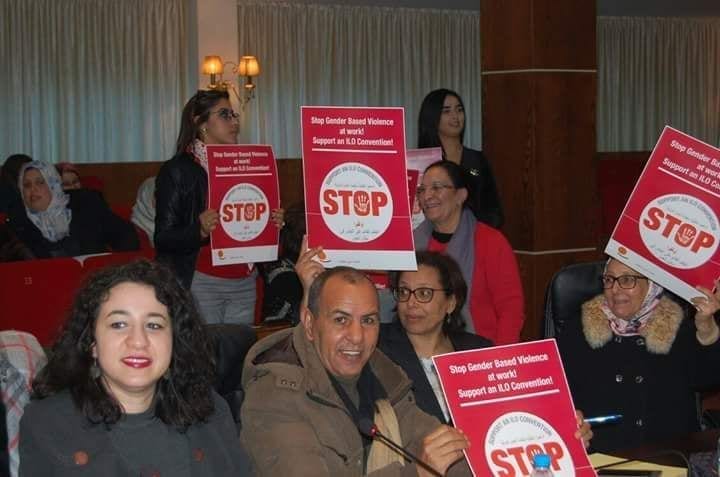
Mar 8, 2018
Women union activists and their allies in Morocco and Tunisia celebrated International Women’s Day this week with events that highlighted the need for a global standard to address gender-based (GBV) violence at work.
“Violence is escalating dramatically. Without an international agreement and deterrent laws that protect women at home, in society and in workplaces, we cannot move forward,” says Saida Ouaid, a member of the Executive Office of the Democratic Confederation of Labor (CDT) in Morocco.
Ouaid and other women union leaders and allies took part in a March 6 event “Toward an International Convention for the Elimination of Gender-Based Violence in the Workplace” at the Parliament in Rabat, in coordination with Morocco’s Secretariat of Equity and Equality.
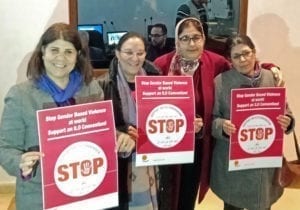
Touriya Lahrech (far left),coordinator of the CDT’s Women Department, joins women union members to discuss an ILO convention addressing gender-based violence at work. Credit: Mohamed Yakkane
The International Labor Organization (ILO) is considering a convention (regulation) that would address violence and harassment against workers. The Solidarity Center is part of an International Trade Union Confederation (ITUC) campaign for passage of a strong ILO convention.
In Tunisia, 100 union members from across the country gathered for a March 8 event where they also discussed the need for passage of an ILO convention on gender-based violence at work.
“The gathering is an opportunity for women to stand up for their struggles to defend their rights and freedom, and to promote equality and an environment free of violence,” Samir Al-Shefi, deputy general-secretary of the General Union of Tunisian Workers (UGTT) Women, Youth and Association, said in opening the event.
Naima Hammami, one of two women on the UGTT’s executive office, paid tribute to the struggles of Tunisian, Palestinian, Syrian and Arab women around the world. The event was sponsored by UGTT’s Women, Youth and Association Department, together with the Solidarity Center.
Gender-Based Violence ‘Widespread at Work’
At both the Morocco and Tunisia events, experts discussed preliminary findings on gender-based violence at work based on participatory field research sponsored by the Solidarity Center and CDT in Morocco and the UGTT in Tunisia.
Discussing the research in Morocco, Najat Al-Razi, a gender specialist and sociologist, says gender-based violence is “widespread in the world of work,” and “the most common form of violence against women in workplaces is sexual harassment.”
Asma al-Marani, a member of the Moroccan Union of Labor and the Arab Trade Union Confederation, pointed out that her union receives daily complaints about violence at work from women working in the precarious and informal economy.
CDT leaders noted that as part of the global campaign for an international convention on the elimination of violence in the world of work, the union will continue meeting with a range of allies at the grassroots level until the Geneva Conference with a campaign to push the government to support the ILO draft convention, supplemented by a guiding document implementing the convention.
Representatives from the Njda Center, the Jusour Association, the Women’s Labor Union, the Association of Women for Equality and Democracy (Afed) and other union leaders and journalists also took part in the Rabat event.
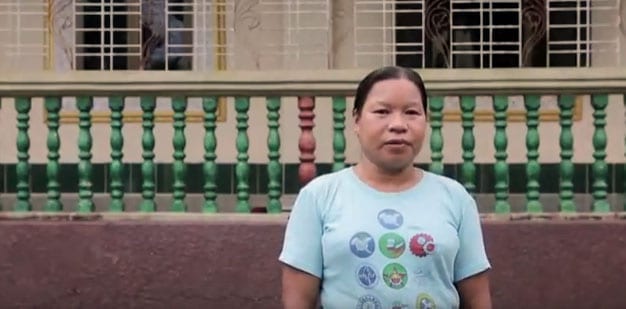
Mar 1, 2018
Hello. I am Daw Tin Tin Thein. I am 43 years old. I have worked in this factory for nine years. I am responsible for sanitation and garbage collection in this factory. It means I am responsible for keeping this factory clean and tidy.
I have been a member of the trade union for four years. During these four years, I found that the negotiations and coordination between the factory owner and the CBA [collective bargaining agreement] have resulted in many successful resolutions.
Workers receive salaries and minimum wages. Workers also enjoy transportation services and social security benefits. We conduct educational activities under the leadership of CTUM [Confederation of Trade Unions-Myanmar].
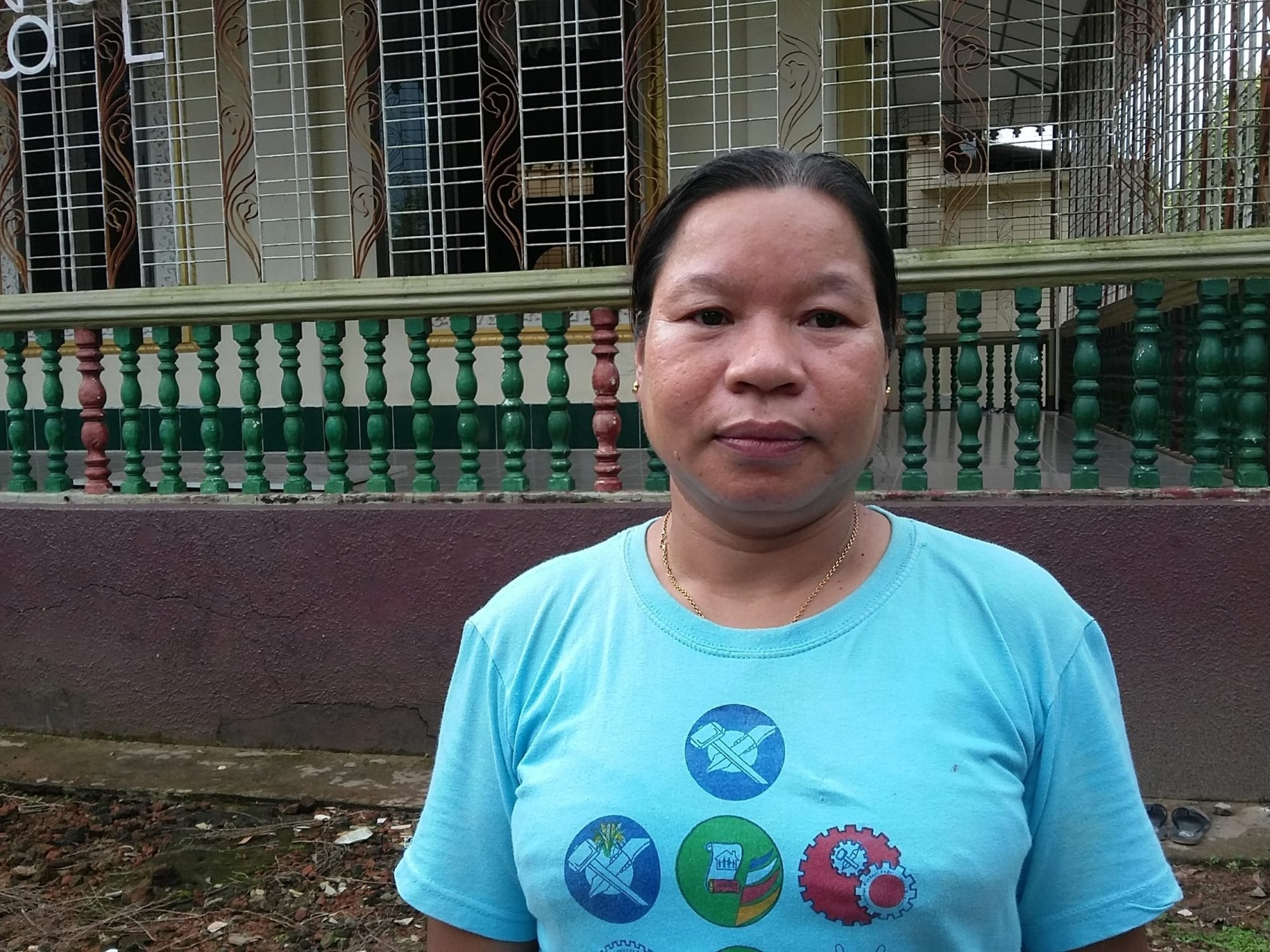
Mar 1, 2018
Daw Tin Tin Thein, 43, works in a factory just outside Yangon, Myanmar’s capital, where workers ground and mold clay for building materials like floor and roof tiles. Thien, a janitor, beams with pride when she describe how she is responsible for “keeping the factory clean and tidy.”
As a member of the Confederation of Trade Unions-Myanmar (CTUM), she says workers receive social security benefits and have access to educational opportunities.
Thein is among workers whose unions and associations the Solidarity Center works with around the world—and she tells her story at the Solidarity Center Workers Equality Forum.
At the Workers Equality Forum, domestic workers from Kenya, garment workers from Cambodia, factory workers in Honduras and many others share their struggles on the job and often, how they are winning rights on the job through their unions.









